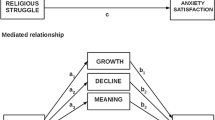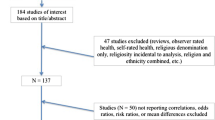Abstract
Menopause represents an important life change, particularly for religious women whose identity is significantly related to family. Two competing hypotheses are examined: one, because religious women have their identity focused on family and child rearing, spirituality will be related to increased menopausal symptoms because menopause represents a loss of identity and purpose; and two, because spirituality can provide strength and comfort during difficult times, it will, therefore, be related to decreased menopausal symptoms. To test these competing hypotheses, questionnaires were administered to 218 women (average age 55, 35% premenopausal, 26% peri-menopausal, 39% postmenopausal) who were members of the Church of Jesus Christ of Latter Day Saints. Regression analyses indicated that higher levels of spiritual strength were related to decreased levels of reported menopausal symptoms. Spiritual strength was also related to increased benefit finding during menopause, decreased concern with body appearance, and increased use of adaptive coping strategies. We conclude that finding strength in spirituality may help religious women cope better with the life changes associated with menopause.
Similar content being viewed by others
References
Ali, S. R., Mahmood, A., Moel, J., Hudson, C., & Leathers, L. (2008). A qualitative investigation of Muslim and Christian women’s views of religion and feminism in their lives. Cultural Diversity and Ethnic Minority Psychology, 14, 38–46.
Ballard, K. D., Kuh, D. J., & Wadsworth, M. (2001). The role of the menopause in women’s experiences of the ‘change of life’. Sociology of Health & Illness, 23(4), 397–424.
Begalke, R. (1999). How do mid-life women integrate their faith into the transition of children leaving home? Masters Abstracts International, 37(06), 1974.
Berkin, C. S. (1986). In behalf of women over 40: Understanding the importance of menopause. Social Work, 31(5), 378–384.
Bernhard, L. (1997). Self-care strategies of menopausal women. Journal of Women and Aging, 9(1–2), 77–89.
Brady, M. J., Peterman, A. H., Fitchett, G., & Cella, D. (1999). The expanded version of the functional assessment of chronic illness therapy-spiritual well-being scale (FACIT-Sp-Ex): Initial report of psychometric properties. San Diego, CA: Paper presented at the annual meeting of the Society of Behavioral Medicine.
Carver, C. S. (1997). You want to measure coping but your protocol’s too long: Consider the brief cope. International Journal of Behavioral Medicine, 4, 92–100.
Carver, C. S., & Antoni, M. H. (2004). Finding benefit in breast cancer during the year after diagnosis predicts better adjustment 5 to 8 years after diagnosis. Health Psychology, 26, 595–598.
Carver, C. S., Pozo-Kaderman, C., Price, A. A., Noriega, V., Harris, S. D., Derhagopian, R. P., et al. (1998). Concern about aspects of body image and adjustment to early stage breast cancer. Psychosomatic Medicine, 60, 168–174.
Conboy, L., Domar, A., & O’Connell, E. (2001). Women at mid-life: Symptoms, attitudes, and choices, an internet based survey. Maturitas, 38, 129–136.
Courtenay, B. (1992). Religiosity and adaptation in the oldest-old. International Journal of Aging and Human Development, 34, 47–56.
Deeks, A. A., & McCabe, M. P. (2004). Well-being and menopause: An investigation of purpose in life, self-acceptance and social role in premenopausal, perimenopausal and postmenopausal women. Quality of Life Research, 13, 389–398.
Edgell, P., & Docka, D. (2007). Beyond the nuclear family? Familism and gender ideology in diverse religious communities. Sociological Forum, 22, 26–51.
George, S. A. (2002). The menopause experience: A woman’s perspective. Journal of Obstetric, Gynecological, & Neonatal Nursing, 31, 77–85.
George, L. K., Larson, D. B., Koenig, H. G., & McCullough, M. E. (2000). Spirituality and health: What we know, what we need to know. Journal of Social and Clinical Psychology, 19, 102–116.
Hunter, M. S. (1992). The women’s health questionnaire (WHQ): A measure of mid-aged women’s perceptions of their emotional and physical health. Psychology & Health, 7, 45–54.
Jacobs, P. A., Hyland, M. E., & Ley, A. (2000). Self-rated menopausal status and quality of life in women aged 40–63 years. British of Journal of Health Psychology, 5, 395–411.
Jaeger, D. (2004). Sexuality and spirituality: A phenomenological inquiry of eleven midlife women. Dissertation Abstracts International Section A: Humanities and Social Sciences 65(5-A).
Jones, J. B. (1997). Representations of menopause and their health care implications: A qualitative study. American Journal of Preventive Medicine, 13, 58–65.
Lenz, E. (1992). Rights of passage: How women can find a new freedom in their midyears. Los Angeles: Lowell House.
Levin, J. S., & Chatters, L. M. (1998). Religion, health, and psychological well-being in older adults: Findings from three national surveys. Journal of Aging and Health, 10, 504–531.
McCullough, M. E., Hoyt, W. T., Larson, D. B., Koenig, H. G., & Thoresen, C. (2000). Religious involvement and mortality: A meta-analytic review. Health Psychology, 19, 211–222.
National Institutes of Health (NIH). (2005). NIH state-of-science conference statement on management of menopause-related symptoms. NIH Consensus Statement Science Statements, 22, 1–38.
Nolan, J. W. (1986). Developmental concerns and the health of midlife women. Nursing Clinics of North America, 21, 151–159.
O’Connell, K. A., & Skevington, S. M. (2005). The relevance of spirituality and personal beliefs to health-related quality of life: Themes from focus groups in Britain. British Journal of Health Psychology, 10, 379–398.
Pargament, K. I., Koenig, H. G., Tarakeshwar, N., & Hahn, J. (2004). Religious coping methods as predictors of psychological, physical, and spiritual outcomes among medically ill elderly patients: A two-year longitudinal study. Journal of Health Psychology, 9, 713–730.
Peterman, A. H., Fitchett, G., Brady, M. J., Hernandez, L., & Cella, D. (2002). Measuring spiritual well-being in people with cancer: The functional assessment of chronic illness therapy-spiritual well-being scale (FACIT-Sp). Annals of Behavioral Medicine, 24, 49–58.
Phillay, A. L. (1988). Midlife depression and the “empty nest” syndrome in Indian women. Psychological Reports, 63, 591–594.
Raup, J. L., & Myers, J. E. (1989). The empty nest syndrome: Myth or reality? Journal of Counseling and Development, 68, 180–183.
Robinson, K., & Sharon, E. (2001). Mood, marriage and menopause. Journal of Counseling Psychology, 48, 77–84.
Schneider, H. P. (2002). The quality of life in the post-menopausal woman. Best Practice & Research Clinical Obstetrics & Gynaecololgy, 16, 395–409.
Smith, T. B., McCullough, M. E., & Poll, J. (2003). Religiousness and depression: Evidence for a main effect and the moderating influence of stressful life events. Psychological Bulletin, 129, 614–636.
Sullivan, P. (1998). Empty nest syndrome. Our Children, 23, 32–33.
Tomich, P. L., & Helgeson, V. S. (2004). Is finding something good in the bad always good? Benefit finding among women with breast cancer. Health Psychology, 23, 16–23.
Utian, W. H., & Boggs, P. P. (1999). The North American menopause society 1998 menopause survey. Part I: Postmenopausal women’s perceptions about menopause and midlife. Menopause, 6, 122–128.
Willits, F. K., & Crider, D. (1988). Religion and well-being: Men and women in the middle years. Review of Religious Research, 29, 281–294.
Author information
Authors and Affiliations
Corresponding author
Additional information
An erratum to this article can be found at http://dx.doi.org/10.1007/s10943-009-9280-8
Rights and permissions
About this article
Cite this article
Steffen, P.R. Spirituality and Severity of Menopausal Symptoms in a Sample of Religious Women. J Relig Health 50, 721–729 (2011). https://doi.org/10.1007/s10943-009-9271-9
Received:
Accepted:
Published:
Issue Date:
DOI: https://doi.org/10.1007/s10943-009-9271-9




